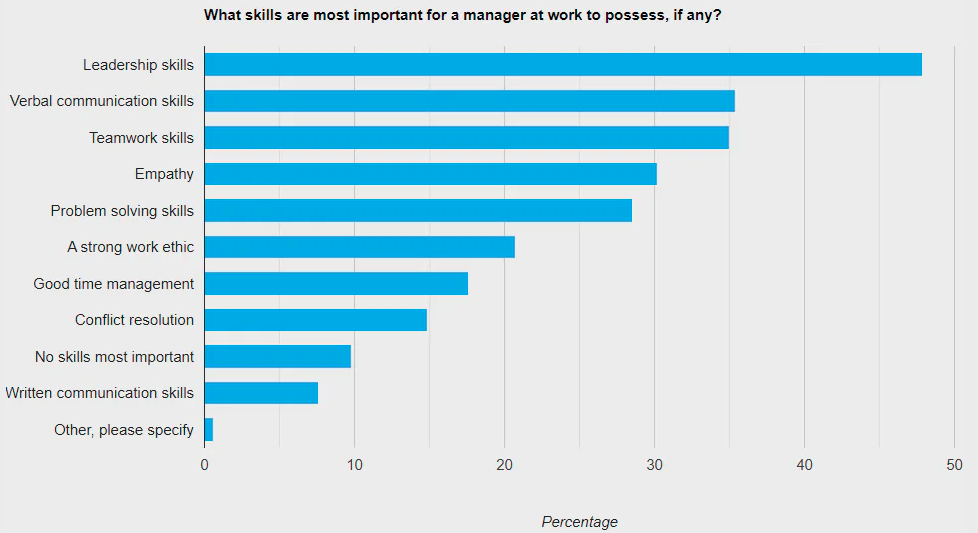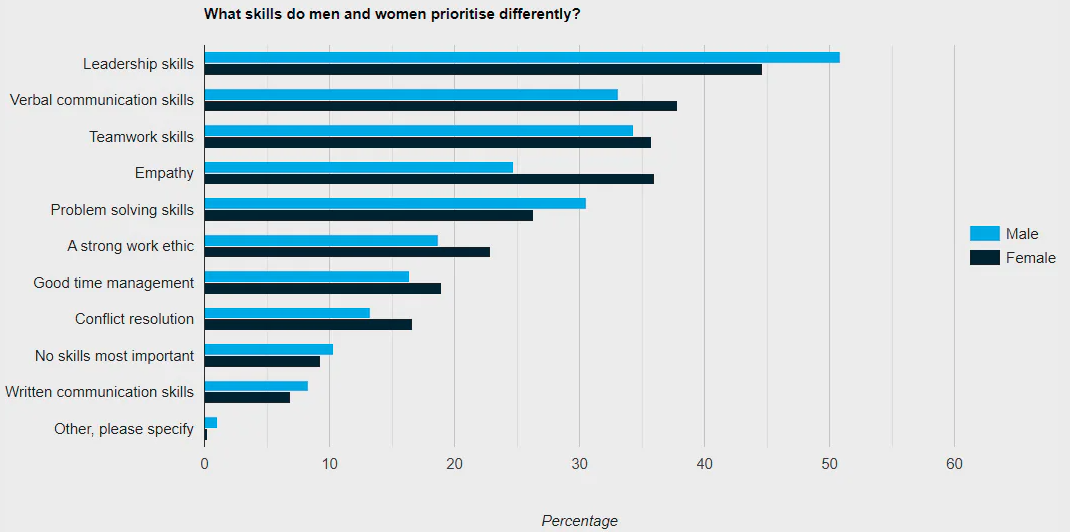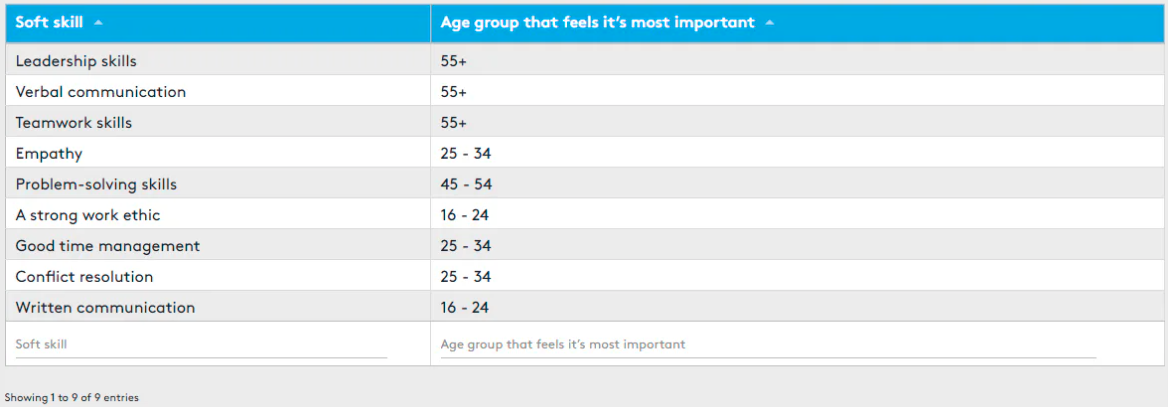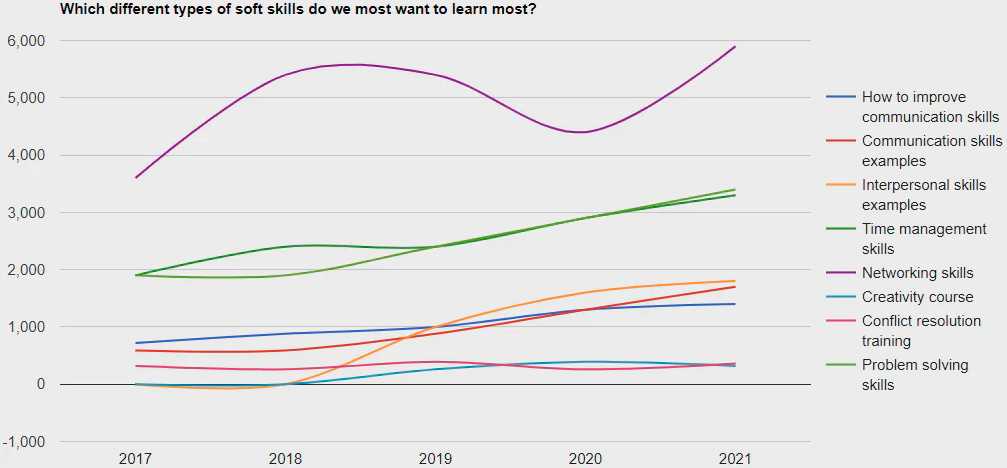Soft skills are absolutely essential in the workplace, whether you’re at the bottom of the corporate ladder or you’re a CEO.
High levels of social and emotional intelligence make a big difference when it comes to workplace performance. This is true for those who manage teams of employees, work as part of a team, and even those who work independently.
But which soft skills are the most important in the eyes of the British workforce? And which skills are we most eager to learn? To find out, we conducted a survey of UK adults alongside an analysis of online search volumes conducted over the last five years on the topic of soft skills.
Key findings: list of soft skills in the workplace - what's in demand?
An overview of our key soft skills facts and figures:
- Leadership soft skills are considered the most important soft skill for managers in the workplace to possess, followed by verbal communication and teamwork skills
- Young people aged 16-24 value written communication more than any other age group
- Nearly a third of UK adults believe empathy is the most important soft skill their manager could possess
- More men than women feel that leadership is the most important managerial skill
- Online searches for communication skills have increased year on year since the start of the Coronavirus pandemic
Leadership soft skills: which soft skills do UK adults most want their managers to possess?
If you’re a manager, your employees will notice if there’s something to be desired when it comes to your communication or leadership soft skills. But many soft skills are also often up for debate in terms of their effectiveness. That’s why we wanted to find out exactly which soft skills are regarded as being the most important in the UK workplace.
In March 2022, we used the market research tool Censuswide to conduct a survey asking 2,000 UK adults: “What skills do you think are most important for a manager at work to possess, if any?” (Tick up to three)
Answer options:
- Leadership skills
- Verbal communication
- Teamwork skills
- Empathy
- Problem-solving skills
- A strong work ethic
- Good time management
- Conflict resolution
- There are no skills that are most important for a manager at work to possess
- Written communication skills
- Other, please specify

The four major desirable soft skills (as shown in the chart above) are detailed below.
Desirable soft skills for managers and leaders
- Leadership skills are considered the most important soft skill, with nearly half (47.85%) of all UK adults stating that this is the most important skill for a manager to have
- This is followed closely by verbal communication and teamwork skills, with over a third of us (35.4% and 35.01% respectively) believing that these are the most important managerial soft skills
- Just under a third (30.18%) of all UK adults believe that empathy is the most important soft skill for a manager to possess
- The soft skills that UK adults don’t seem to regard quite as highly include written communication (7.62%) and conflict resolution (14.89%)
Do men and women prioritise soft skills differently?
Numerous studies have observed the differences in the qualities and attributes of men and women in the workplace. But what hasn’t been studied as extensively is the impact our gender has on the qualities we look for in a manager or prospective employer. That’s why we asked all of our survey participants to disclose their gender when answering the question “What skills do you think are most important for a manager at work to possess, if any?”

As you can see from the chart: leadership soft skills remain a priority for all genders.
Scope of soft skills preference – men vs women
- Overall, both genders consider leadership skills to be the most important soft skill for a manager to possess in the workplace. However, more men than women see leadership as being the most valuable (50.9% of men vs 44.6% of women)
- The second most common soft skill that men consider most important is teamwork skills, with 34.43% of men giving this answer
- For women, the second most important soft skill for a manager to have is verbal communication, with 37.84% of women giving this answer as one of the most important skills for a manager to have
- Far more women than men value empathy as a key soft skill when it comes to their managers, as 36.02% of women and just 24.69% of men selected this option in the survey
What do different age groups believe are the most important soft skills?
There are many different factors that can influence which attributes we value the most at work, and one of the most obvious is age. But do UK workers of different generations value different soft skills in their managers? To find out, we asked each of our survey respondents to tell us their age when answering the survey.

As you can see from the table: stark contrasts between the soft skills competencies valued by each age group.
Soft skills competencies: how do various age groups regard workplace soft skills?
- Leadership skills, verbal communication and teamwork skills are most valued by those aged 55+
- Whereas the age group that opted for problem-solving skills was 45–54-year-olds
- Empathy, time management and conflict resolution were highly valued by 25–34-year-olds when it comes to the managerial soft skills they most prefer
- Written communication and a strong work ethic are the skills most valued among those aged 16-24
Which different types of soft skills do we most want to learn?
Personal and professional development depends on acquiring and using a wide range of soft skills. We now know which attributes UK adults most want their managers to possess. But which soft skills do we most want to improve for ourselves?
To find out, we conducted an analysis of tens of thousands of online searches relating to soft skills conducted in the UK over the last five years using the tool Keyword Finder. This enabled us to discover which qualities UK adults most want to learn and develop, and which are most sought-after in different towns and cities across the country.

As you can see from the chart: the demand for soft skills in communication is steadily climbing, while networking rises sharply.
In demand: list of soft skills in the workplace based on search volume
- Searches for networking skills have almost doubled over the last five years. These searches appear to have been significantly impacted by the pandemic lockdown, with a sizable decrease in searches occurring between 2019 and 2020
- Search interest in problem-solving skills has increased year on year since 2018, clearly indicating its growing desirability as a soft skill
- Searches for time-management skills have also followed suit, with interest increasing each year since 2019
- Searches for terms such as ‘how to improve communication skills’ and ‘interpersonal skills examples’ increased at the start of the pandemic, and have continued to do so ever since
Which UK city is most eager to improve its soft skills?
Every month in the UK, tens of thousands of us turn to Google to look for ways to become more employable, learn new skills, and improve the skills we already have - whether that’s through online courses, conferences, events and talks, or even looking for a career coach or mentor.
But which towns and cities in the UK are most keen to expand their soft skills? To find out, we conducted another analysis of online searches, but this time looking at the locations in which these searches are most commonly performed.
Our analysis found that:
- When it comes to wanting to improve our communication skills, Nottingham takes the lead, with more searches being conducted here than any other part of the UK for the term ‘how to improve communication skills’ (76 searches per 100,000 people). This is then followed by Birmingham, Plymouth, and Southampton
- It seems that interpersonal skills in general are highly sought after in Birmingham: more searches are conducted in the city each year for ‘interpersonal skills examples’ than any other part of the UK. Each year, 72 searches are conducted for this term in Birmingham for every 100,000 people – double the national average (36 for every 100,000 people)
- Time-management skills are also most-searched in the city of Birmingham, at a rate of 124 per 100,000. This is then followed by Nottingham, Manchester, and Coventry
- When it comes to problem-solving skills, the people of Manchester are most keen to expand their knowledge, with an average of 128 searches being conducted per 100,000 people. That’s almost twice the national average rate (75)
Methodology and considerations
We used the Keyword Finder tool to obtain the average yearly searches for common soft-skills related terms and divided each town or city’s value by its population, before multiplying by 100,000 to calculate the number of average yearly searches per 100,000 people for each term.
It’s important to note; although we’ve suggested that the locations with the highest rates of searches for specific skills correlate to interest in learning more about them, this may not necessarily be the case. Search intent will likely differ from person to person, and some individuals may be searching for these terms for purposes other than learning.
Soft skills statistics in the UK – 2022 summary
If that’s not enough, here are some more of the latest facts, figures and statistics surrounding soft skills in 2022:
- The global soft skills training market size is currently worth $23.64 billion and is expected to reach a staggering $47.16 billion by 2027
- 91% of talent professionals agree that soft skills are very important to the future of recruitment and HR
- A study conducted by Yale University found that employees with emotionally intelligent supervisors were happier, more creative, and more innovative
- The same study also found that 70% of employees whose managers had little emotional intelligence (EQ) said their main feelings toward work were negative
- The five most in-demand soft skills have been found to be creativity, persuasion, collaboration, adaptability and emotional intelligence
